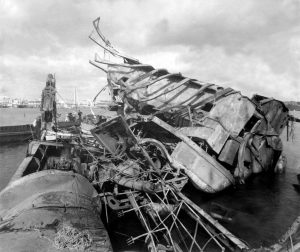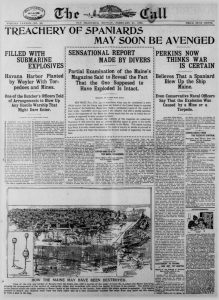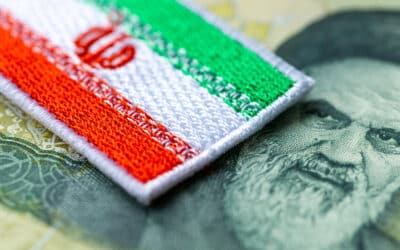February 15 marks the anniversary of the destruction of the USS Maine, a momentous event that precipitated America’s involvement in the Cuban independence movement and what eventually became known as the Spanish American War. Most Americans gloss over this period in their history, it being quite overshadowed by the eventual scale of World War I.
But for those who dig in and familiarize themselves with the circumstances and aftermath of the war, a familiar pattern emerges. The Spanish American War very much established a blueprint and example of how to portray a crisis to justify proceeding toward a desired intervention. It also solidified a departure from the long-held American tradition and disposition of non-intervention and avoidance of imperial activity, in stark contrast to its closest global rivals like Spain, England, and France. By increasing our awareness of this pattern, we can better identify and avoid such problems in the future.
The Expansionist Zeitgeist
The turn of the century in America was a very transformational era for the Union. For years, president Grover Cleveland had done much to limit the size and scope of government, from handling a number of railroad union strikes through injunction to preventing the annexation of Hawaii. But his replacement in William McKinley did not share Cleveland’s anti-imperial temperament, at least not for long. As well, westward expansion to the Pacific was largely complete and, as Frederick Jackson Turner concluded in 1893, this left Americans for the first time in their history without a frontier. That expansionist culture and desire had long impressed itself on the fabric of American life and now there was nowhere else to expand but beyond its current borders.
On top of that, American industry was experiencing a glut in production and, everywhere one looked, there were voices, both within and without Washington, advocating expansion for the sake of the economy. Alfred Thayer Mahan, then director of the Naval War College, published a very influential book in 1890, “The Influence of Sea Power Upon History”, that advocated for a strong navy and the establishment of bases abroad to support that navy in protecting foreign trade. (Never mind that a potential naval expansion would greatly benefit his very institution) Mahan was politically well connected, winning over the support of famed Senator Henry Cabot Lodge and Teddy Roosevelt. The consensus seemed to be firmly established. And it did not hurt that politically connected crony American industry had more than $50 million invested in Cuba. In the words of John Carlisle, the Secretary of the Treasury under Grover Cleveland, “the prosperity of our people depends largely on their ability to sell their surplus products in foreign markets at remunerative prices.”
Given the spirit of the time, it is not difficult to see why Cuba represented an attractive first foray into such foreign adventurism. The largest Caribbean island, in very close proximity to the American coast, with a foreign occupier that was economically on the ropes, barely hanging onto its last remaining colonial vestiges, Cuba was quite the easy target. So, when a charismatic Jose Marti was able to unite a number of Cuban factions for one final stand against their Spanish occupiers in 1895, Washington found itself eager to assert itself.
The Trap Is Set
It is ironic to note that there is an eerie resemblance between McKinley’s public statements and eventual actions and later presidential statements regarding presumed American neutrality, like those of Wilson and Roosevelt: in some ways, he provided the example. Though McKinley had previously stated that “We want no wars of conquest; we must avoid the temptation of territorial aggression,” his actions seem to contradict him.
We have established that the spirit of the 1890s in America seemed committed to some future plan of economic growth in global markets, with that growth quite likely coming in the form of greater US influence outside of its borders and regional sphere of influence. The only seemingly lacking element remaining was a trigger, an opportunity and excuse to assert itself more forcefully.
McKinley’s placement of the USS Maine in Havana harbor represented exactly that and it is here that we note the emergence of a very common element of the aforementioned pattern of interventionist behavior in the history of US actions, that of initial American presence as a signal or even, put simply, bait. The mere presence of the Maine in this instance represented quite the risky and provocative gesture. And no matter what the intended effect may have been, the implications are no less heinous. In one scenario, McKinley and his executive branch placed hundreds of men and military equipment into an active guerrilla war zone with the possible goal of applying pressure against Spain for concessions. In an even worse scenario, those men were placed in harm’s way for the implicit goal of inviting violence and attack. Indeed, some mused that, “There may be an explosion any day in Cuba which would settle a great many things,” and, as we know now, it certainly did.
Regardless of what the specific purpose of the Maine’s presence was, the result remains the same. On the night of February 15, 1898, the USS Maine exploded killing 268 men. Speculation was not in short supply following the explosion and the quick and constant blame placed on Spain surely did much to further the public’s descent into war fever. The eventual inquiry conclusion was that the explosion occurred by an underwater mine which, even if correct, should not have been such a surprising possibility given its location. That conclusion has been called into question more recently, with more likely possibilities being that it could have been caused by an internal accident within the ship due to coal or gunpowder combustion.
Whatever the cause of the explosion, the incident threw the citizenry into a frenzy and represents perhaps the first of what would be a long line of similar occurrences used as fuel for the fires of war. Consider World War I, in which the Lusitania and other ships found themselves in harm’s way and used as an excuse for belligerency. Or the Pacific Fleet’s presence in Pearl Harbor. Or the US Marine barracks bombing in Beirut, Lebanon. Or the Khobar Towers bombing in the mid-’90s. Or any number of other similar examples. The overarching lesson is simple: in matters of war, the US has a long tradition of placing those sworn to protect in dangerous, compromising, and unnecessary situations and their deaths are then used as yet further justification for yet further dangerous action.
Media Complicity
In the aftermath of the USS Maine explosion, the media within the US was quick to finger the blame toward Spain. It may be tempting to conceive of the American press, with its protections against state encroachment, as having ever been a dispassionate arbiter or reporter of the facts. But throughout the years leading up to 1898 and the months following the event, the press was able to establish an authoritative perspective on Cuba that was sure to lead Americans to particular conclusions regarding what was best for Cubans and any possible involvement that the US should have.
While it may be difficult to prove in any definitive sense, the coverage surrounding Cuban independence during the 1890s, like many future periods of interventionist fervor, almost seemed to be organized and co-opted by government itself, or, at least, certain influential members within it. There can be, of course, a great deal of synergy and advantage to such a relationship: state actors are very often interested in controlling their image and welcome positive light on their actions and the press has quite an incentive to drum up fear and uncertainty in its coverage so as to encourage sales and readership/viewership.
This was certainly the case leading up the Spanish American War. One of the preeminent newspapermen of his day, William Randolph Hearst, took great pains to push public opinion through reporting against Spain and toward Cuba and war. Take, for example, the embarrassing intercepted letter of a Spanish diplomat criticizing then-president William McKinley. In pure, over the top fashion, the headline from Hearst’s “New York Journal” read, “Worst Insult to the United States in Its History.” And following the Maine incident, with little to no evidence or inquiry into the actual cause of the explosion, the paper proclaimed that the “Destruction of the Warship Maine Was the Work of an Enemy,” even despite many statements to the contrary, with the Secretary of the Navy stating that it was “probably the result of an accident,” and Naval Academy experts adding that “no torpedo such as is known in modern warfare can of itself cause an explosion as powerful as that which destroyed the Maine.” Little thought seems to have been given to just why Spain would dare commit such an aggressive act, it being obviously against their interest of less US involvement.
But Hearst believed that “Maine is a great thing”, and other media outlets and outspoken experts continued to reconsider and support Cuban intervention. Hearst “filled page after page with mendacious ‘scoops’, fabricated interviews with unnamed government officials, and declarations that the battleship had been ‘destroyed by treachery’ and ‘split in two by an enemy’s secret infernal machine,” the result being that the Journal doubled in circulation in a month’s time. Whitelaw Reid of the “New York Tribune” spoke of the “absolute necessity of controlling Cuba for our own defense.” This skewing of the truth continued even after the US declared war and became involved in combat in Cuba, with the press routinely downplaying the contributions of the Cubans themselves and glorifying the American efforts and involvement.
If the American people were skeptical of this media bias, it certainly was not voiced loudly enough to make it into the history books. And the 20th century and beyond is rife with similar examples of the press and citizenry showing a remarkable tendency to avoid such criticism. Americans were swept into a fervor over the Japanese attack at Pearl Harbor, seemingly without much thought as to understanding their intentions or whether it was truly an unprovoked action. More recently, the invasions of Afghanistan and Iraq saw the media toeing an incredible line, trusting government reports at face value despite contrary evidence. And in Syria, amazingly, little thought seems to have been given to Bashar al-Assad’s being blamed in a string of alleged chemical attacks, attacks which actually bear a striking resemblance to the USS Maine disaster, given the extreme disincentive for Assad to do any such thing given his position. Media support has long played a factor in swaying public opinion toward war and the Spanish American War is as good an example as any of that phenomenon.
Cuba Libre and the Villainy That Opposed It
One more ingredient was also present in the run-up to the Spanish American War and has played a very similar role in the rationale for intervention ever since; that of the indigenous population and its independence movement against Spain. Given the deep-rooted American ethos of freedom and independence, the message of Cuban independence could not help but resonate with the American people. That movement had a long history in Cuba, with its first and second attempts proven unsuccessful and the third finally being underway after fifteen years of planning.
But these struggles are often too spread out and too complex for most to grasp or react to at the instinctual level required to garner the type of support needed for war. In order to do that, it can be more effective to use a symbol. The US needed a villain. And, given that the King of Spain at the time was a fourteen-year-old boy and the reigning regent an Austrian princess, another target was needed. That target was simple enough to find in General Valeriano Weyler. Kinzer details Hearst’s portrayal of Weyler as:
“Weyler, the brute, the devastator of haciendas, and the outrager of women…pitiless, cold, an exterminator of men…there is nothing to prevent his carnal, animal brain from running riot with itself in inventing tortures and infamies of bloody debauchery.”
What was missing, to some extent, was the nasty nature of the conflict from both sides. Struggles for independence can often be portrayed in a very black and white, good and evil fashion, without the nuance that they deserve and without weighing the costs of those struggles. As Tom Woods distills regarding the portrayal by the press at the time; “although Spanish brutalities were undeniable, yellow journalism had made the details of the conflict in Cuba between the government and the rebels seem simpler than they really were.” While Weyler and the Spanish overlords indeed sought to avoid rebellion by often brutal means, such as the relocation of Cubans in rebel-held areas to fortified camps that “resulted in the starvation and death of over 100,000 Cubans”, rebel forces also incited violence and property damage, destroying farms, livestock, and sugar mills, that produced its own set of problems for the populace.
Indeed, the truth of the matter was nowhere near as black and white as the “yellow journalists” of the time portrayed it. Historian Ralph Raico paints quite the different picture: “Like many revolutionaries before and after, they had little real support among the mass of the population. Thus they resorted to terrorist tactics — devastating the countryside, dynamiting railroads, and killing those who stood in their way. The Spanish authorities responded with harsh countermeasures.” As well, as Bolton Hall, US labor leader at the time, pointed out, “the cruelty exhibited in Cuba is no peculiarity of the Spanish race; within the last few weeks instances of cruelty to negroes have occurred in this country which equal, if they do not surpass, anything which has occurred in Cuba.”
This is made all the more tragic by the fact that, during the initial outbreak of rebellion in 1895, the U.S. actually sided with Spain, advocating Spanish rule with a measure of autonomy to the Cubans. As military historian Walter Millis surmised, “seldom can history have recorded a plainer case of military aggression; yet seldom has a war been started in so profound a conviction of its righteousness.”
And it wouldn’t be the last one to be started with this conviction, either. From the World Wars to the Cold War, any number of CIA regime change operations, like those against Mossadegh in Iran or Arbenz in Guatemala, to more modern examples like those of the deposition of Saddam Hussein in the war on terror (yet another example of a dictator outliving the previous usefulness they once possessed); all included a demonization element that, on the surface, seemed clear and convincing but, upon further investigation, quickly proved otherwise. The conclusion is a rather simple one: take no news as gospel truth, always question the popular sentiment, and never believe a politician that stands to gain from the actions they advocate for.
The Bottom Line
William Graham Sumner said of the Spanish American War, “We have beaten Spain in a military conflict, but we are submitting to be conquered by her on the field of ideas and policies. Expansionism and imperialism are nothing but the old philosophies of national prosperity which have brought Spain to where she is now.” In her great test and trial at the dawning of the 20th century, the United States failed to uphold her values. As a result, its people have also learned to live in the shadow of these past mistakes and, as evidenced by the continual cycle of US intervention, failed to uphold their values as well. But, with any luck, armed with the knowledge of what to look for, we can begin to break that cycle.
Bio: Adam Graham is the founder of and primary contributor to www.nokingbutchrist.org. He lives in Virginia with his wife, two children, digital book collection, and comprehensive disdain for the State.
































